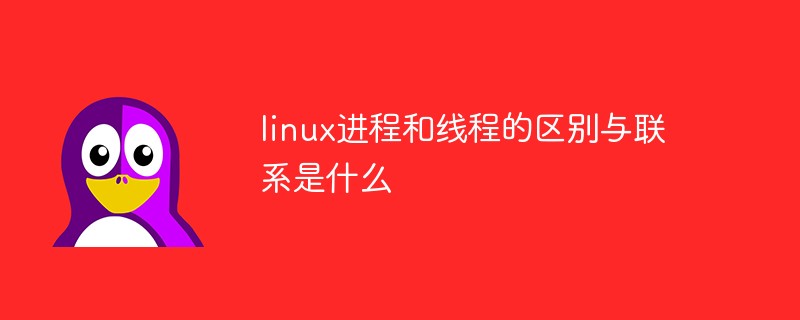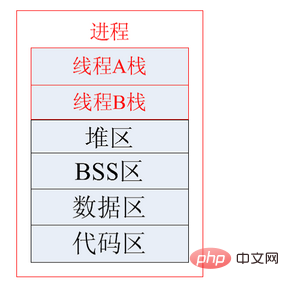 Operation and Maintenance
Operation and Maintenance
 Linux Operation and Maintenance
Linux Operation and Maintenance
 What is the difference and connection between linux processes and threads
What is the difference and connection between linux processes and threads
What is the difference and connection between linux processes and threads
Linux processes and threads: 1. The difference is that different operating system resource management methods, processes have independent address spaces, but there is no separate address space between threads; 2. The connection is that a thread can be created and canceled Another thread, multiple threads in the same process can execute concurrently, and threads are just different execution paths in a process.

#The operating environment of this tutorial: linux7.3 system, Dell G3 computer.
What is the difference and connection between Linux processes and threads
Contact:
One thread can create and cancel another Threads; multiple threads in the same process can execute concurrently.
Compared with processes, threads are a concept closer to execution bodies. They can share data with other threads in the same process. But it has its own stack space and an independent execution sequence.
Difference:
The main difference between processes and threads is that they are different operating system resource management methods. The process has an independent address space. After a process crashes, it will not affect other processes in protected mode, and threads are just different execution paths in a process. Threads have their own stacks and local variables, but there is no separate address space between threads. The death of one thread is equivalent to the death of the entire process. Therefore, multi-process programs are more robust than multi-thread programs, but when switching processes, it consumes a lot of time. The resources are larger and the efficiency is lower. However, for some concurrent operations that require simultaneous operation and sharing of certain variables, only threads, not processes, can be used.
In short, a program has at least one process, and a process has at least one thread.
The division scale of threads is smaller than that of processes. This enables high concurrency of multi-threaded programs.
In addition, the process has an independent memory unit during execution, and multiple threads share memory, thus greatly improving the running efficiency of the program.
Threads are still different from processes during execution. Each independent thread has an entry point for program execution, a sequential execution sequence, and an exit point for the program. However, threads cannot execute independently and must exist in the application program, and the application program provides multiple thread execution control.
From a logical point of view, the meaning of multi-threading is that in an application, multiple execution parts can be executed at the same time. However, the operating system does not regard multiple threads as multiple independent applications to implement process scheduling and management and resource allocation. This is the important difference between processes and threads.
Extended knowledge
In many classic operating system textbooks, the process is always defined as the execution of the program An instance does not perform anything, it just maintains various resources required by the application, while a thread is the real execution entity.
In order for a process to complete a certain amount of work, the process must contain at least one thread.

Process, intuitively speaking, after the program saved on the hard disk is run, an independent memory body will be formed in the memory space. This memory body has its own address space. , has its own heap, and the upper-level affiliated unit is the operating system.
Threads exist in processes and are the smallest units for scheduling and execution by the operating system. To put it simply, threads do work. \color{red}{Threads are what work. }Threads are what do the work.
A process is a program with certain independent functions. A running activity on a certain data set. A process is an independent unit for resource allocation and scheduling in the system. A thread is an entity of a process and the basic unit of CPU scheduling and dispatch. It is a basic unit that is smaller than a process and can run independently. The thread itself basically does not own system resources, only a few resources that are essential for running (such as a program counter, a set of registers and a stack), but it can share all the resources owned by the process with other threads belonging to the same process. .
If the process is a resource steward, responsible for requesting resources from the owner, then the thread is the hard worker. If the process is a resource steward, responsible for requesting resources from the owner, then the thread is the hard worker. A housekeeper must complete a job, which requires at least one coolie. That is to say, a process contains at least one thread and can also contain multiple threads. If coolies want to work, they need to rely on the housekeeper, so a thread must belong to a certain process. The process has its own address space, and threads use the address space of the process. In other words, threads have access to the resources in the process, such as heaps, stacks, static storage areas, etc.
The thread is a proletariat, but when the proletariat works, it must have its own labor tool. This labor tool is the stack. The thread has its own stack. This stack still uses the address space of the process, but this space is used Threads are marked as stacks. Each thread will have its own private stack, which cannot be accessed by other threads.
What the process maintains are the resources (static resources) contained in the program, such as: address space, open file handle set, file system status, signal processing handler, etc.;
Threads maintain Maintained run-related resources (dynamic resources), such as: running stack, scheduling-related control information, signal sets to be processed, etc.;
Threads and processes have their own advantages and disadvantages in use: Thread execution overhead Small, but not conducive to resource management and protection; and the process is just the opposite.
Recommended learning: Linux video tutorial
The above is the detailed content of What is the difference and connection between linux processes and threads. For more information, please follow other related articles on the PHP Chinese website!

Hot AI Tools

Undresser.AI Undress
AI-powered app for creating realistic nude photos

AI Clothes Remover
Online AI tool for removing clothes from photos.

Undress AI Tool
Undress images for free

Clothoff.io
AI clothes remover

Video Face Swap
Swap faces in any video effortlessly with our completely free AI face swap tool!

Hot Article

Hot Tools

Notepad++7.3.1
Easy-to-use and free code editor

SublimeText3 Chinese version
Chinese version, very easy to use

Zend Studio 13.0.1
Powerful PHP integrated development environment

Dreamweaver CS6
Visual web development tools

SublimeText3 Mac version
God-level code editing software (SublimeText3)

Hot Topics
 1668
1668
 14
14
 1426
1426
 52
52
 1328
1328
 25
25
 1273
1273
 29
29
 1255
1255
 24
24
 Linux Architecture: Unveiling the 5 Basic Components
Apr 20, 2025 am 12:04 AM
Linux Architecture: Unveiling the 5 Basic Components
Apr 20, 2025 am 12:04 AM
The five basic components of the Linux system are: 1. Kernel, 2. System library, 3. System utilities, 4. Graphical user interface, 5. Applications. The kernel manages hardware resources, the system library provides precompiled functions, system utilities are used for system management, the GUI provides visual interaction, and applications use these components to implement functions.
 vscode Previous Next Shortcut Key
Apr 15, 2025 pm 10:51 PM
vscode Previous Next Shortcut Key
Apr 15, 2025 pm 10:51 PM
VS Code One-step/Next step shortcut key usage: One-step (backward): Windows/Linux: Ctrl ←; macOS: Cmd ←Next step (forward): Windows/Linux: Ctrl →; macOS: Cmd →
 How to check the warehouse address of git
Apr 17, 2025 pm 01:54 PM
How to check the warehouse address of git
Apr 17, 2025 pm 01:54 PM
To view the Git repository address, perform the following steps: 1. Open the command line and navigate to the repository directory; 2. Run the "git remote -v" command; 3. View the repository name in the output and its corresponding address.
 How to run java code in notepad
Apr 16, 2025 pm 07:39 PM
How to run java code in notepad
Apr 16, 2025 pm 07:39 PM
Although Notepad cannot run Java code directly, it can be achieved by using other tools: using the command line compiler (javac) to generate a bytecode file (filename.class). Use the Java interpreter (java) to interpret bytecode, execute the code, and output the result.
 How to run sublime after writing the code
Apr 16, 2025 am 08:51 AM
How to run sublime after writing the code
Apr 16, 2025 am 08:51 AM
There are six ways to run code in Sublime: through hotkeys, menus, build systems, command lines, set default build systems, and custom build commands, and run individual files/projects by right-clicking on projects/files. The build system availability depends on the installation of Sublime Text.
 What is the main purpose of Linux?
Apr 16, 2025 am 12:19 AM
What is the main purpose of Linux?
Apr 16, 2025 am 12:19 AM
The main uses of Linux include: 1. Server operating system, 2. Embedded system, 3. Desktop operating system, 4. Development and testing environment. Linux excels in these areas, providing stability, security and efficient development tools.
 laravel installation code
Apr 18, 2025 pm 12:30 PM
laravel installation code
Apr 18, 2025 pm 12:30 PM
To install Laravel, follow these steps in sequence: Install Composer (for macOS/Linux and Windows) Install Laravel Installer Create a new project Start Service Access Application (URL: http://127.0.0.1:8000) Set up the database connection (if required)
 git software installation
Apr 17, 2025 am 11:57 AM
git software installation
Apr 17, 2025 am 11:57 AM
Installing Git software includes the following steps: Download the installation package and run the installation package to verify the installation configuration Git installation Git Bash (Windows only)



